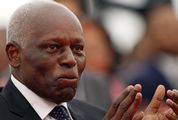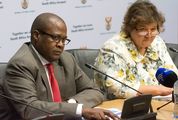IT IS a pity the question still has to be asked, but it does: "Yes," answers Enzani Technologies co-founder, MD and electrical engineer Tlaleng Moabi, "engineering is still a male-dominated industry, but the universe conspired against me and I became an engineer.
"I’m not sure if it’s something to brag about because of the challenges you have to face every day. Half the time you’re not dealing with technical issues but perceptual ones, and perhaps cultural too.
"As a woman, people tend to assume you might be a town planner or something, rather than assuming you’re technical in nature."
Moabi recounts a funny story: the three partners in Enzani, two black women and one man, were invited to a technical evaluation function by a client. Moabi and her female partner attended. They came, they sat, they waited. And waited.
The event didn’t start and 15 minutes later the chairperson asked where their technical people were. He thought, as one would, that while the two ladies had made it, obviously the company’s technical people were yet to arrive.
Enzani was founded in 2005 and while Moabi says the 10 years have "flown by", on reflection she is also rightly impressed by how far the company has come. The partners met at university (graduating from Wits in 1999) and, half-jokingly, said they would get work experience before launching their own company. In 2005, one of them called the others and reminded them of this promise, and so Enzani — which means "to start" — got started.
In the beginning the company was self-funded: "We were young and our liabilities were low. It was easy to cut down on things — like manicures. And meals; I remember waiting with my partner at a restaurant for a potential client who was really late so we ordered a meal, just one, and shared it as we couldn’t afford two. Every cent counted," Moabi says.
...
BEING "careful and cautious" with money and always reinvesting any funds into the company ensured its success and growth.
"Enzani was also born at a time when BEE was really being promoted, but more than anything we wanted to be the best in what we do; we didn’t want to just be black economic empowerment compliant," she says. "We wanted to sell our expertise: BEE will get you in but only experience and competence will ensure you stay there. We never want to sell our ‘blackness’."
Initially Enzani was an engineering consultancy, "selling hours", but when the partners wanted to evolve into an engineering procurement contractor, offering a turnkey solution which meant moving into projects at the construction and procurement stage within the electrical space, they needed funding.
"Anglo Zimele, Anglo’s enterprise development wing, helped with working capital. We have never done anything long-term with the banks," Moabi says.
Their partnership with Group Five (which now has a small shareholding in Enzani) started in about 2009.
"We approached Group Five looking for work. We had completed some contracts in the mining sector, but then things were starting to cool down," Moabi says.
"We looked at the private sector — most of our work was in the industrial sector up to then, hence our focus on water, mining and renewable energy.
"We chose those sectors because of their potential."
Group Five executive director Jesse Doorasamy says what was inspiring about Enzani was that the three shareholders were "passionate, competent and astute engineering professionals who we recognised had immense potential. The fact that the company was black women-owned was the cherry on top rather than a prime motivator."
Enzani does a lot of work with Group Five in the mining sector — and "one of the only commercial projects we’ve done: the Soweto Theatre in Jabulani," Moabi says. "It was nice to work on something so far removed from industry — to have to worry about finishes and make something beautiful."
...
DOORASAMY says Enzani brought technical expertise in electrical panel manufacturing and supply that Group Five did not have internally.
"They have augmented our capacity, without which we would have had to decline work. This symbiotic relationship has benefited them as well as business units across Group Five construction and our clients," he says. "As is always the case in these matters, the difference that Enzani’s dedicated leadership makes it palpable. The directors are responsive, technically competent and can be trusted to deliver what is required."
And just because Enzani is growing and has an enviable resumé of industrial projects under its belt doesn’t mean Group Five cuts anyone any slack: "We still have to compete for their business," says Moabi.
Moabi echoes Doorasamy in confirming that Enzani has always prided itself on its passion, personal involvement and hands-on approach with Group Five, although the latter is getting harder as Enzani grows.
It currently has 30 full-time core staff and 120 contracted workers on the payroll, which means that its own strategic issues are having to be addressed.
Enzani’s growth is such that the new BEE codes and the R50m annual turnover parameters may not be that far away.
"It’s a good thing," says Moabi. "But it means we’ll be playing in a different league. We’ll have to institute different processes commensurate with a big organisation and we’ll have a lot of catching up to do."
The only thing holding Enzani back is, as usual, SA’s skills shortage: "It’s an ongoing challenge. In the last two years we have spent a lot of time training people," Moabi says.
"At first we thought we could just recruit from within the market — but it’s not easy, especially competing with the big companies. As soon as we’ve trained them, our interns get poached and that’s a huge problem."
Moabi is passionate about skills development but feels that too often young people with potential are ignored because companies don’t have the time to groom them.
"We are so focused on delivery, so the biggest challenge is finding a balance between experience and nurturing young talent," she says.
"It’s so fulfilling when you see people grow and it worries me that young talent is losing the opportunity for training simply because small businesses are juggling so many things and cannot afford to lose sight of their core competence."
Fortunately, Enzani’s relationship with Group Five is helpful in developing skills. "When we have the right, young talent, in some cases we are able to take them to the Group Five Academy," Moabi says.
"We share skills when we see gaps; we can ask Group Five for somebody to help us, and vice versa. It’s a challenge because Group Five also has its own deliverables, so they must concentrate on those. But at least we are keeping that talent within the industry and not losing them from the economy completely."

Group Five executive director Jesse Doorasamy recognised Enzani Technologies’ potential, as well as their expertise. Picture: SUPPLIED
IT IS a pity the question still has to be asked, but it does: "Yes," answers Enzani Technologies co-founder, MD and electrical engineer Tlaleng Moabi, "engineering is still a male-dominated industry, but the universe conspired against me and I became an engineer.
"I’m not sure if it’s something to brag about because of the challenges you have to face every day. Half the time you’re not dealing with technical issues but perceptual ones, and perhaps cultural too.
"As a woman, people tend to assume you might be a town planner or something, rather than assuming you’re technical in nature."
Moabi recounts a funny story: the three partners in Enzani, two black women and one man, were invited to a technical evaluation function by a client. Moabi and her female partner attended. They came, they sat, they waited. And waited.
The event didn’t start and 15 minutes later the chairperson asked where their technical people were. He thought, as one would, that while the two ladies had made it, obviously the company’s technical people were yet to arrive.
Enzani was founded in 2005 and while Moabi says the 10 years have "flown by", on reflection she is also rightly impressed by how far the company has come. The partners met at university (graduating from Wits in 1999) and, half-jokingly, said they would get work experience before launching their own company. In 2005, one of them called the others and reminded them of this promise, and so Enzani — which means "to start" — got started.
In the beginning the company was self-funded: "We were young and our liabilities were low. It was easy to cut down on things — like manicures. And meals; I remember waiting with my partner at a restaurant for a potential client who was really late so we ordered a meal, just one, and shared it as we couldn’t afford two. Every cent counted," Moabi says.
...
BEING "careful and cautious" with money and always reinvesting any funds into the company ensured its success and growth.
"Enzani was also born at a time when BEE was really being promoted, but more than anything we wanted to be the best in what we do; we didn’t want to just be black economic empowerment compliant," she says. "We wanted to sell our expertise: BEE will get you in but only experience and competence will ensure you stay there. We never want to sell our ‘blackness’."
Initially Enzani was an engineering consultancy, "selling hours", but when the partners wanted to evolve into an engineering procurement contractor, offering a turnkey solution which meant moving into projects at the construction and procurement stage within the electrical space, they needed funding.
"Anglo Zimele, Anglo’s enterprise development wing, helped with working capital. We have never done anything long-term with the banks," Moabi says.
Their partnership with Group Five (which now has a small shareholding in Enzani) started in about 2009.
"We approached Group Five looking for work. We had completed some contracts in the mining sector, but then things were starting to cool down," Moabi says.
"We looked at the private sector — most of our work was in the industrial sector up to then, hence our focus on water, mining and renewable energy.
"We chose those sectors because of their potential."
Group Five executive director Jesse Doorasamy says what was inspiring about Enzani was that the three shareholders were "passionate, competent and astute engineering professionals who we recognised had immense potential. The fact that the company was black women-owned was the cherry on top rather than a prime motivator."
Enzani does a lot of work with Group Five in the mining sector — and "one of the only commercial projects we’ve done: the Soweto Theatre in Jabulani," Moabi says. "It was nice to work on something so far removed from industry — to have to worry about finishes and make something beautiful."
...
DOORASAMY says Enzani brought technical expertise in electrical panel manufacturing and supply that Group Five did not have internally.
"They have augmented our capacity, without which we would have had to decline work. This symbiotic relationship has benefited them as well as business units across Group Five construction and our clients," he says. "As is always the case in these matters, the difference that Enzani’s dedicated leadership makes it palpable. The directors are responsive, technically competent and can be trusted to deliver what is required."
And just because Enzani is growing and has an enviable resumé of industrial projects under its belt doesn’t mean Group Five cuts anyone any slack: "We still have to compete for their business," says Moabi.
Moabi echoes Doorasamy in confirming that Enzani has always prided itself on its passion, personal involvement and hands-on approach with Group Five, although the latter is getting harder as Enzani grows.
It currently has 30 full-time core staff and 120 contracted workers on the payroll, which means that its own strategic issues are having to be addressed.
Enzani’s growth is such that the new BEE codes and the R50m annual turnover parameters may not be that far away.
"It’s a good thing," says Moabi. "But it means we’ll be playing in a different league. We’ll have to institute different processes commensurate with a big organisation and we’ll have a lot of catching up to do."
The only thing holding Enzani back is, as usual, SA’s skills shortage: "It’s an ongoing challenge. In the last two years we have spent a lot of time training people," Moabi says.
"At first we thought we could just recruit from within the market — but it’s not easy, especially competing with the big companies. As soon as we’ve trained them, our interns get poached and that’s a huge problem."
Moabi is passionate about skills development but feels that too often young people with potential are ignored because companies don’t have the time to groom them.
"We are so focused on delivery, so the biggest challenge is finding a balance between experience and nurturing young talent," she says.
"It’s so fulfilling when you see people grow and it worries me that young talent is losing the opportunity for training simply because small businesses are juggling so many things and cannot afford to lose sight of their core competence."
Fortunately, Enzani’s relationship with Group Five is helpful in developing skills. "When we have the right, young talent, in some cases we are able to take them to the Group Five Academy," Moabi says.
"We share skills when we see gaps; we can ask Group Five for somebody to help us, and vice versa. It’s a challenge because Group Five also has its own deliverables, so they must concentrate on those. But at least we are keeping that talent within the industry and not losing them from the economy completely."




















Change: 0.40%
Change: 0.47%
Change: -0.49%
Change: 0.53%
Change: 1.03%
Data supplied by Profile Data
Change: 1.71%
Change: 1.28%
Change: 0.40%
Change: 0.00%
Change: 1.64%
Data supplied by Profile Data
Change: -1.27%
Change: 0.00%
Change: 0.05%
Change: -0.08%
Change: 0.35%
Data supplied by Profile Data
Change: -0.02%
Change: 0.21%
Change: -0.06%
Change: 0.53%
Change: 0.70%
Data supplied by Profile Data